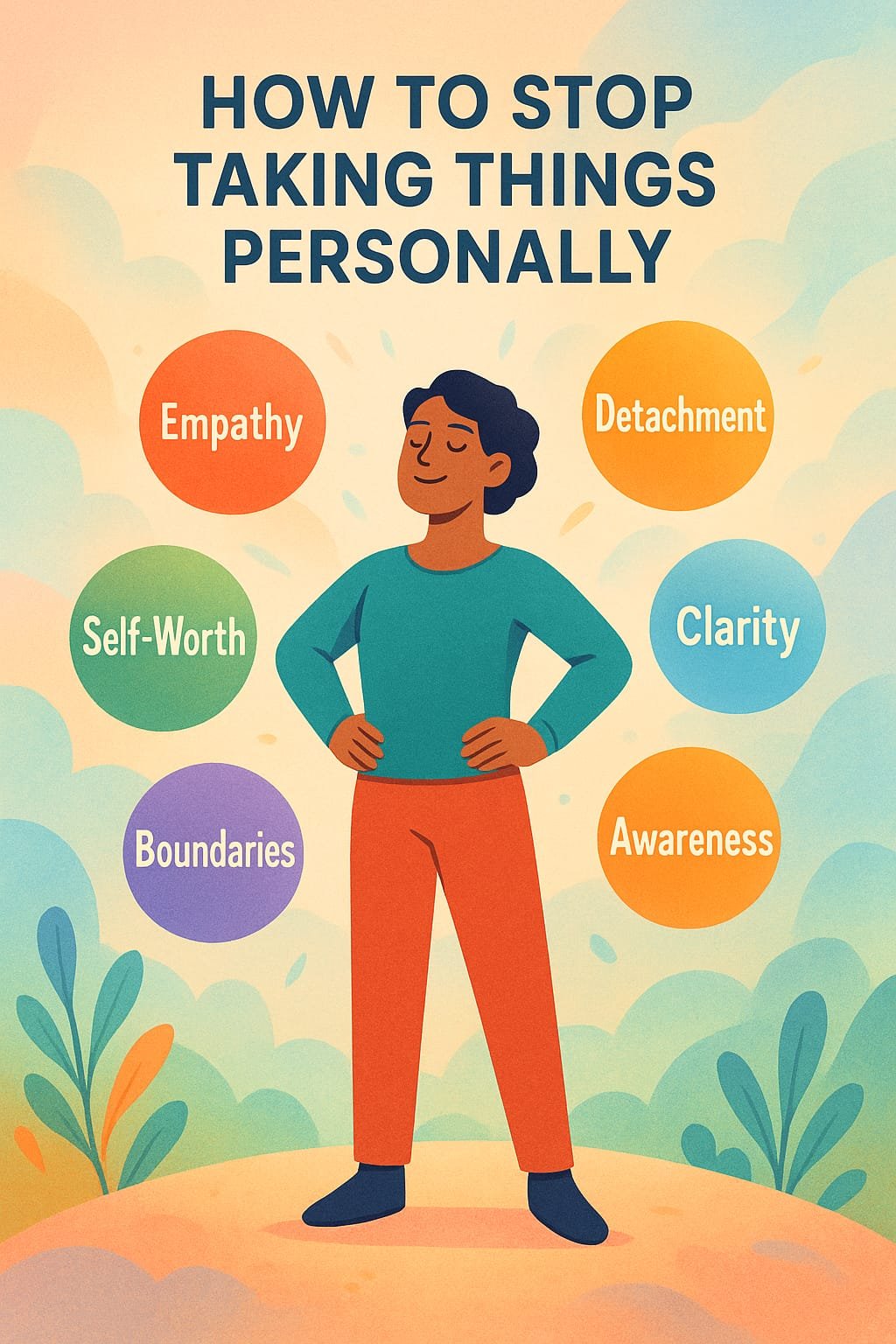Have you ever walked away from a conversation, replaying it over and over in your head, wondering what you did wrong? Maybe someone didn’t respond to your message right away, or a co-worker seemed a little off during a meeting—and suddenly, you’re questioning your worth, overanalyzing every word, and assuming it’s your fault. If this sounds familiar, you’re not alone. Many of us struggle with how to stop taking things personally, especially in a world where communication is fast, emotions are high, and validation often feels scarce.
Taking things personally is emotionally exhausting. It creates unnecessary stress, damages self-esteem, and can lead to misunderstandings and conflict in relationships. When we internalize everything—people’s words, moods, silences—it becomes nearly impossible to distinguish between what’s ours to carry and what’s not.
This blog is here to help you break that cycle. With the right mindset shifts, you can learn how to stop taking things personally and start reclaiming your inner peace. These are not just fluffy self-help ideas; they are grounded, practical changes in perspective that can transform how you experience relationships, conflict, and self-worth.
In this post, we’ll explore 6 powerful mindset shifts that will not only help you stop taking things personally but also empower you to stand confidently in your own truth. This blog is—all with one goal: to help you protect your peace without closing your heart.
“Your value doesn’t decrease based on someone’s inability to see your worth.”
Whether you’re overly sensitive to feedback, easily hurt by others’ opinions, or find yourself withdrawing at the slightest hint of rejection, this guide is for you.
Why We Take Things Personally
To truly learn how to stop taking things personally, we first need to understand why we do it in the first place. It’s not just about being “too sensitive” or “overreacting”—it’s deeper than that. Taking things personally is often a learned emotional response rooted in our past experiences, beliefs, and even biology.
1. It Starts With Our Conditioning
From childhood, many of us are taught—consciously or unconsciously—that approval from others defines our worth. A disapproving look from a parent, a teacher’s criticism, or being left out on the playground becomes internalized as: “I’m not good enough.” Over time, we begin to equate our value with how others treat us. So, when someone criticizes or ignores us, we interpret it as confirmation of our unworthiness—even if their actions have nothing to do with us.
“Childhood wounds echo loudest in adulthood. But awareness helps us soften the noise.”
2. We Seek Validation for Identity and Belonging
Humans are wired for connection. According to Psychologist Abraham Maslow’s hierarchy of needs, belonging is one of our core human needs, right after food and safety. So, when we perceive rejection, disapproval, or emotional distance, it threatens our sense of belonging. This emotional threat activates our fight, flight, or freeze response—even if the situation isn’t actually dangerous. That’s why a small comment can feel like a personal attack. When someone says, “That idea doesn’t make sense,” what we hear is: “I’m stupid.” But those interpretations are stories our mind creates, not facts.
“When you stop living your life based on what others think of you, real freedom begins.”
– Shannon L. Alder
3. Our Inner Critic Is Loud and Persistent
We all have an inner dialogue, and for many of us, it’s not kind. When that internal voice is constantly critical—“You’re not enough”, “You always mess up”, “People are just pretending to like you”—then it becomes easy to personalize even neutral interactions.
- Someone forgetting to text back? “They’re ignoring me.”
- A boss giving constructive feedback? “They think I’m a failure.”
These thoughts come not from truth, but from unresolved self-doubt.
“We don’t see things as they are; we see them as we are.”
– Anais Nin
4. Trauma and Past Experiences Resurface
If you’ve experienced past emotional wounds—bullying, betrayal, abandonment—your nervous system may be hypersensitive to perceived rejection or criticism. This is called Emotional triggering. Even seemingly small interactions can activate big feelings because they resemble earlier pain. Your brain is not trying to hurt you—it’s trying to protect you from being hurt again. But often, it misinterprets signals. That’s why awareness and healing are essential components of learning how to stop taking things personally.
“Your triggers are the guides to your healing.”
– Yung Pueblo
5. We Confuse Empathy With Responsibility
If you’re highly empathetic, you’re probably very in tune with other people’s emotions. This is a gift—but without boundaries, it can become a burden. Empaths often take on others’ moods, guilt, or pain as if it’s their own fault. You might think, “They’re upset, I must’ve done something wrong,” even when it has nothing to do with you. Learning to empathize without absorbing is key to break this pattern.
“You can be a good person with a kind heart and still say no to people.”
6. Perfectionism Fuels Personalization
Perfectionists often set impossibly high standards and fear failure or criticism. So when something goes wrong—or even slightly off track—they take it as a personal flaw.
- If someone offers a suggestion?
They think “I don’t know what I’m doing.” - If they stumble while speaking in a meeting?
“I looked so unprofessional. Everyone thinks I’m incompetent.”
This “all-or-nothing” thinking turns every interaction into a personal referendum on their worth. Understanding this perfectionism is a powerful step in learning how to stop taking things personally.
“Perfectionism is the voice of the oppressor.”
– Anne Lamott
Once you identify these triggers, you’re halfway to gaining control. The key lies not in controlling what others say or do, but in managing your own interpretations. You don’t have to attend every argument you’re invited to.
6 Mindset Shifts to Stop Taking Things Personally
1. Realize It’s Not Always About You
This is the most crucial mindset shift when learning how to stop taking things personally. People act based on their beliefs, experiences, moods, and even insecurities. Often, their behavior has nothing to do with you.
For Example, when someone lashes out or acts distant, silently say to yourself: “This is more about them than me.” It’s not denial—it’s emotional maturity.
“What people say about you is a reflection of them, not you.”
– Deepak Chopra
2. Question Your Inner Dialogue
That voice in your head that says, “They think I’m not good enough,” needs to be challenged. It’s time to reframe those thoughts.
Ask yourself:
- Is there any real proof that this is about me?
- Could there be another explanation?
- Am I assuming the worst?
- What else might be going on that has nothing to do with me?
Replace assumptions with curiosity. This shift not only helps with how to stop taking things personally but also improves emotional intelligence.
3. Strengthen Your Self-Worth
If your self-esteem is tied to external validation, every critique will feel like a dagger. Build your worth from within.
Ways to strengthen self-worth:
- Practice daily affirmations
- Keep a “wins” journal
- Surround yourself with supportive people
The stronger your inner foundation, the less you’ll need others’ approval—and the less likely you’ll be to personalize things.
“No one can make you feel inferior without your consent.”
– Eleanor Roosevelt
4. Pause Before Reacting
Emotions can be like waves—intense, but temporary. Before reacting, give yourself space to feel without judgment.
The 4-Second Rule:
When triggered, pause for 4 seconds. Breathe deeply. Ask yourself: “Is this worth my peace?” That moment of pause is powerful in mastering how to stop taking things personally.
From personal experience, this pause has saved me countless unnecessary arguments. It’s not weakness; it’s wisdom.
5. Set Healthy Emotional Boundaries
Taking things personally often comes from blurred boundaries. You don’t have to absorb everything people project onto you.
Emotional boundary affirmations:
- “I am not responsible for others’ feelings.”
- “I can be compassionate without internalizing pain.”
- “I protect my energy.”
By reinforcing these boundaries, you give yourself emotional breathing room, which is vital when learning how to stop taking things personally.
6. Embrace Imperfection and Growth
Mistakes and criticism are part of life. Instead of fearing them, see them as growth opportunities. This mindset shift can transform how you perceive feedback.
Ask:
- What can I learn from this?
- How can I use this to grow?
Remember, people who grow emotionally don’t avoid feedback—they learn to filter it. Constructive? Absorb it. Toxic? Reject it. That’s true strength.
“I am not what happened to me. I am what I choose to become.”
– Carl Jung
Bonus Tips to Reinforce the Mindset Shifts
To help these mindset shifts stick, here are a few other things you can do.
- Mindfulness meditation: Helps observe thoughts without clinging to them.
- Journaling: Write out your triggers and reframe them on paper.
- Therapy or coaching: A safe space to explore and heal deeper wound.
Final Thoughts: You Are Not Defined by Others
We take things personally not because we’re weak, but because we’re human. Because we’ve been hurt, conditioned, or misunderstood in the past. But understanding the why behind our reactions gives us the power to change the how. As someone who used to internalize everything—from a teacher’s offhand comment to a friend forgetting to call back—I can tell you this: Freedom lies in detachment. You don’t need to build walls; just better filters.
So the next time you feel that tightness in your chest, that spiraling thought of “Was it me?”, pause and remember: Your emotional response is valid—but it isn’t always rooted in reality.
Learning how to stop taking things personally is a journey. Some days will feel easier than others. Be patient with yourself. Keep choosing growth over reaction. Keep choosing peace over control.
“Just because you feel it, doesn’t mean it’s true.”
Ready to Stop Taking Things Personally?
With self-awareness, healing, and the right mindset shifts, you can begin to stop taking things personally—and start living with more clarity, confidence, and calm. You have the tips. You have the awareness. Now it’s about practice and patience. Keep repeating this truth: “I am in control of how I feel. I do not have to carry what isn’t mine.”
If this blog resonated with you, share it with someone who could use a mindset shift. Let’s spread emotional resilience, one perspective at a time.
Also Read Why We Keep Chasing Approval ? Break Free from Validation.
Subscribe and Never Miss a Motivational Boost !!

